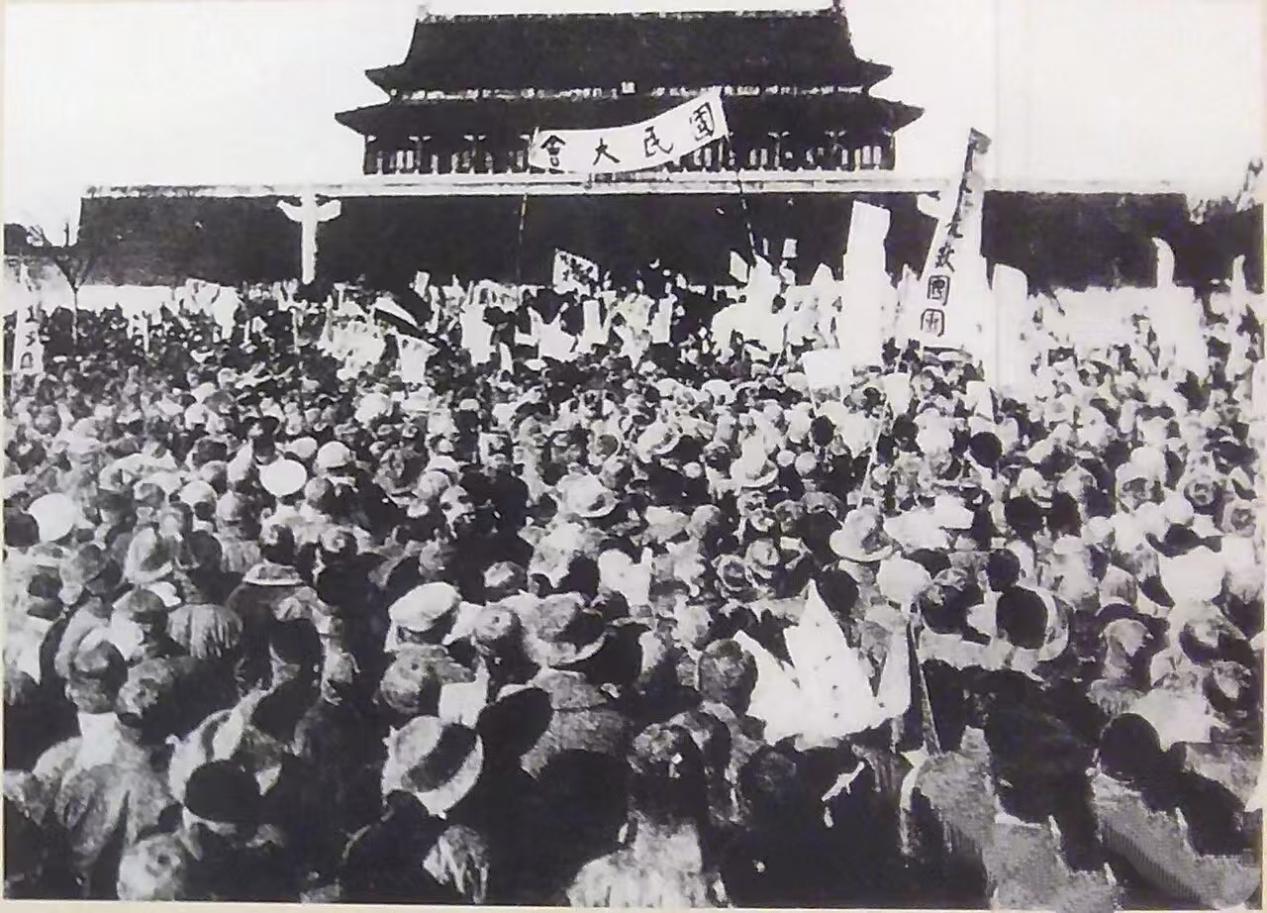为深入学习贯彻党的二十大精神,加强学生党员的党性修养,在思想上政治上行动上坚定不移地同党中央保持高度一致,现以党史学习教育为契机,外国语学院学生党支部开展“党史三十秒”系列活动,从而更好地让学生党员们做到学史明理、学史增信、学史崇德、学史力行。
第八期主题为“一口米缸映照严明纪律”。负责本期活动的小组成员有:19英语一班中共党员胡文华、19英语三班中共预备党员温毅平。

从播下革命火种的小小红船到领航复兴伟业的巍巍巨轮,在百年奋斗历程中,我们党领导人民取得了举世瞩目的辉煌成就,书写了波澜壮阔的历史画卷,留下了弥足珍贵的宝贵经验和精神财富。中国共产党的历史是一部丰富生动的教科书,能够让我们认清历史方位,汲取前行的智慧与力量。
From the small red ship that sowed the spark of revolution to the mighty ship that piloted the great cause of renewal, our Party has led the people in making world-renowned brilliant achievements, writing a magnificent historical picture, and leaving behind precious experience and spiritual wealth. The history of the Communist Party of China is a rich and vivid textbook, which can let us have a clear understanding of the historical orientation and draw wisdom and strength for moving forward.
江西井冈山革命博物馆里,收藏着一口棕黄色的陶质米缸。这个米缸高61厘米,腹围167.7厘米,口径36厘米,底径27厘米,鼓腹、曲颈、圆口、竖条纹,就是一口普通的农家米缸。它之所以能被收藏在井冈山革命博物馆,正是因为它见证了中国共产党群众纪律的萌芽,体现着共产党领导的人民军队同任何旧军队的本质区别。
A brown-yellow pottery rice jar is in the Jinggangshan Revolutionary Museum in Jiangxi Province. This rice bowl is 61 cm high, 167.7 cm round, 36 cm diameter, 27 cm bottom diameter, bulging belly, curved neck, round mouth and vertical stripes. It is just an ordinary farm rice jar. The reason why it can be collected in the Jinggangshan Revolutionary Museum is precisely because it witnessed the germination of the mass discipline of the Communist Party of China, reflecting the essential difference between the people’s army led by the Communist Party and any old army.

1927年9月底,毛泽东同志领导的秋收起义部队挺进井冈山,路上辗转到莲花县的甘家村。工农革命军入村以后,为解决吃饭问题,在家里没有人时,就吃掉老乡一家半缸大米。毛泽东得知此事,批评炊事班长,责令军队照价赔偿。由于没有那么多银元,加之这户人家的主人也不在,无法面对面补偿,工农革命军遂留道歉信,又将一床棉絮卷起放入米缸中抵米钱。
At the end of September 1927, Comrade Liu led the Autumn Harvest uprising troops into the Jinggangshan, on the way to Lianhua County Ganjia village. After the Revolutionary Army of Workers and peasants entered the village, in order to solve the problem of eating, when there was no one at home, they would eat half a jar of rice from a fellow countryman. Since there were not enough silver dollars, and the owner of the family was not there, unable to compensate face to face, the Revolutionary Army of Workers and Peasants left a letter of apology, and rolled up a bed of cotton wool into the rice jar to pay for the rice.

秋收起义
这家的主人是一位名叫陈娇枝的妇女。工农红军进村后,村民们由于不知道来的是什么部队,都躲了起来。当部队一离开村子,陈娇枝的丈夫就回到了家里。他看到米缸里放着一床棉絮,缸里原来剩下的米不见了,旁边还有张纸条,上边写着:“对不起,我们刚到你家找不到人,把你们的米吃了。给你们一床棉絮作为补偿,请收下。”他看完后非常激动地说:“这是世界上最好的军队。”不久,这件事在全村传开了,村民们都说工农革命军好。
The owner of the house is a woman named Chen Jiaozhi. When the Red Army of Workers’ and Peasants’ entered the village, the villagers hid themselves because they did not know what troops were coming. As soon as the troops left the village, Chen’s husband returned home. He saw that there was a bed of cotton wool in the rice jar. The rice left in the jar was gone, and there was a note next to it. It said, “Sorry, we just came to your house and could not find anyone and ate your rice. Here is a bed of cotton wool for you. Please accept it. ” He was very excited and said, “This is the best army in the world.” Soon, this matter spread in the whole village, the villagers all said the Revolutionary Army is good.

红军战士写在包袱布上的“六项注意”
村民们从不了解工农革命军到真心拥护党的部队,半缸米背后彰显的“群众利益”是促成这一变化的核心因素。新中国成立后,陈家翻了身,添了新家具,唯独这口缸没有舍得换,成了陈家的传家宝。1969年,米缸被陈娇枝捐赠给井冈山革命博物馆,现在是馆藏的国家一级文物,也是工农革命军纪律严明的历史见证。
The “interests of the masses” behind the half-jar rice is the core factor contributing to the change of villagers from not knowing the revolutionary Army of Workers and peasants to sincerely supporting the army of the Party. After the founding of New China, the Chen family turned over and added new furniture, but only this jar did not give up to change and became the Chen family heirloom. In 1969, the rice jar was donated to the Jinggangshan Revolutionary Museum by Chen Jiaozhi. It is now a first-class national cultural relic in its collection and a historical witness of the strict discipline of the Revolutionary Army of Workers’ and Peasants’ .
一口米缸映照出的群众纪律,在井冈山革命斗争时期演变为“三项纪律”、“六项注意”,并逐步发展完善为“三大纪律、八项注意”。纪律严明也成为党和人民军队的光荣传统和独特优势。不拿群众一针一线、一个红薯,不损坏群众一块门板,所到之处秋毫无犯,体现了人民军队与旧式军队的本质区别。以人为本、执政为民是马克思主义政党的生命根基和本质要求,是党的性质和宗旨的集中体现。只有全党同志坚持全心全意为人民服务,做到权为民所用、情为民所系、利为民所谋,才能使党的事业获得最广泛、最可靠、最牢固的群众基础和力量源泉。
The mass discipline reflected in a rice jar evolved into “three disciplines” and “six points of attention” during the Jinggangshan revolutionary struggle, and gradually improved into “three disciplines and eight points of attention”. Strict discipline has also become a glorious tradition and unique advantage of the Party and the people’s armed forces. They did not take a needle or a sweet potato from the masses, nor did they damage a single door. They made no mistake wherever they went, demonstrating the essential difference between the people’s army and the old-style army. Putting people first and governing for the people is the essential foundation and requirement of a Marxist political party, and it is the concentrated embodiment of the Party’s nature and purpose. Only when all Party comrades are committed to serving the people wholeheartedly, exercising power for them, caring for them, and working for their interests can the Party’s cause gain the broadest, most reliable, and most solid popular base and source of strength.

军民一家亲
强调加强纪律建设是全面从严治党的治本之策。习近平总书记说过,我们党是靠革命理想和铁的纪律组织起来的马克思主义政党,纪律严明是党的光荣传统和独特优势。“三大纪律、八项注意”——是人民军队从胜利走向胜利的重要保证。全面从严治党,重在加强纪律建设。外国语学院学生党支部希望通过讲述“一口米缸”的党史故事,旨在让更多的人从革命文物和党史故事中汲取智慧力量,了解到中国人民军队“一切行动听指挥、不拿群众一针一线、一切缴获要归公”的三大纪律。学生党支部今后也会把营造风清气正的育人环境作为基础性、经常性工作,为党的纪律建设打牢基础。学生党支部的党员们也纷纷表示,会遵守党的纪律,加强党性修养,做一个有责任心、有道德的人,树立正确的人生观、价值观、世界观,在大是大非面前把握住自己,在日常小事和生活细节上守住底线。
一审一校│余珊珊
二审二校│倪娅
三审三校│黄华




